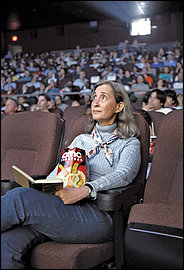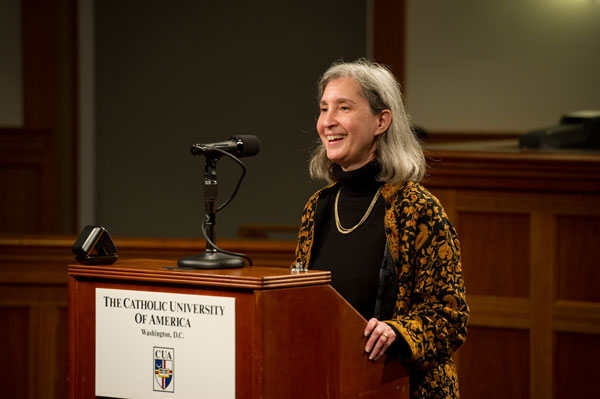Paulzeye interviews distinguished film critic Nell Minow (aka The Movie Mom)

Interview by Paul Stathakis | February 24, 2012
This week it’s critic versus critic as Paulzeye interviews distinguished film critic Nell Minow. Many of Minow’s essays, reviews, and interviews have appeared in major newspapers and media outlets including Yahoo, The Chicago Sun-Times, The Chicago Tribune, USA Today, The New York Times, The Kansas City Star, and the The Wall Street Journal. In addition to writing, Minow also reviews movies every week on radio stations across the United States and in Canada. She is a member of the Online Film Critics Society, the Broadcast Film Critics Association, the Washington D.C. Area Film Critics Association, and the Association of Women Film Journalists.
Whenever she’s not writing about film, chances are she’s appearing on a television station to comment on the financial markets. According to the U.S. Securities and Exchange Commission website Minow, “has written more than 200 articles about corporate governance as well as chapters in treatises on executive compensation, annual shareholder meetings, and in the books Law Stories, The Dance of Change, The Financial Services Revolution, Leadership and Governance from the Inside Out, and How to Run a Company. She is co-author with Robert A. G. Monks of three books, Power and Accountability, The Textbook Corporate Governance, and Watching the Watchers: Corporate Governance for the 21st Century.”
It doesn’t end there. For five years, Minow also acted as a professor at the George Mason University in Washington, D.C., where she taught corporate governance to MBA students.
Minow, a graduate of the University of Chicago Law School, remains an active film critic. Her reviews, as well as a comprehensive archive of her reviews, can be found at a site named Beliefnet. Whether Minow’s busy being a mom or busy being the Movie Mom, one thing is certain: she encompasses all the qualities and virtues of the hard-working 21st Century woman. And her commentary is a reflection of her own persona: honest, sharp, to the point, and always very insightful.
__________________________
Paulzeye: You’ve enjoyed a long career critiquing films. What inspired you to become a film critic?
Nell Minow: I have always loved movies. And I love thinking about them and writing about them. When I was a teenager, Roger Ebert became the movie critic for my local newspaper, the Chicago Sun-Times, and that inspired me to start writing reviews for the newspaper at my high school and later my college paper. I studied film history and criticism in college and read as much as I could about movies. In those days, it was a real challenge to track down classic old movies I wanted to see. I went to art-house theatres and public library showings, set my alarm to get up in the middle of the night to watch old movies on television, and took classes at the Art Institute of Chicago and the American Film Institute in Washington, D.C. After college, I went to law school. I wrote about movies and television from time to time, but did not start reviewing movies again until 1995, when I created the Movie Mom website. In those days, there were thousands, not millions, of websites, most of them created by college students. There was not one corporation or publication on the Web. So, mine was one of the first sites to have movie reviews, and five years later, when the Internet had really grown, Yahoo invited me to be their movie critic.
Paulzeye: As a teenager, I recall reading several of your reviews on Yahoo. How did you acquire the nickname of “Movie Mom”?
Nell Minow: When I started writing reviews, I wanted to differentiate myself from other critics. As the mother of young children, I knew how difficult it was to get reliable guidance on the content of films, and I thought I could combine two things I was interested in, movies and parenting.
Paulzeye: Your latest reviews, film essays, and interviews now appear on the site Beliefnet. There, readers can also access your vast review database. Talk to us a little about the site.
Nell Minow: I love being on Beliefnet, which has a lot of wonderful content about faith, inspiration, and values. We welcome people of all faiths and those who are seeking, questioning, in search of a supportive community, or just curious.

Paulzeye: Most film critics use a four-star rating system but you’ve always scored your films using a school-like letter-based grading system. Why is that?
Paulzeye: What are some of your earliest film memories?
Nell Minow: The first movie I remember seeing is Disney’s “Snow White,” when I was six. I loved it! But, according to a letter my dad sent to my grandparents, they took me to another Disney movie when I was four and every day after that I asked to go back. My parents both love movies, too, and they were wonderful about introducing me to some of their favorites. I loved introducing my children to some of those same movies, too.
Paulzeye: As a critic, you’ve seen a fair share of good films and bad films. How would you define a masterful or good film? How would you define a bad film?
Paulzeye: What are five films, new or old, that should be on every family’s ‘must-see’ list and why?
Paulzeye: People tend to think that being a film critic is an easy profession but surely it must be difficult to spend hours in a multiplex watching several films back to back and then reviewing them. Talk to us about that process. What’s a day at the movies like for you?
Nell Minow: Most days, I see only one or two movies. The independent and foreign films are most often in a little screening room at the Motion Picture Association building across Lafayette Square from the White House during the day and the big studio films are in the evening, in movie theatres with a couple of rows reserved for critics and the rest filled with people who won tickets on radio stations or other giveaways. I really enjoy the other local critics, who have become friends and colleagues. They make even the worst movies fun to watch.
 Paulzeye: As a critic, what do you feel more comfortable writing about: a film that you absolutely loved or one that you absolutely loathed?
Paulzeye: As a critic, what do you feel more comfortable writing about: a film that you absolutely loved or one that you absolutely loathed?
Nell Minow: Both are fine because they both inspire a lot of thoughts. The toughest ones are the bland and mediocre movies, because it is so hard to think of anything to say or any vivid way to say it.
Paulzeye: You’ve interviewed several important figures (politicians, actors, and directors) over the years. What are some of your most memorable interviews and why?
Nell Minow: I especially like talking to writers and directors, who are not interviewed as often as actors and who are more interested in talking. Some of the most memorable include John Irving, Jason Reitman, Randall Wallace, Mike Mills, and John Cameron Mitchell. One of my favorite recent interviews was with Martin Sheen for “The Way.” He is an enthralling raconteur and I could have listened to him all day. I was also very impressed at how kind he was to the staff in the hotel, introducing himself to everyone and really listening to them. Another actor I won’t name infuriated me by being very rude to the waitress and maître d’.
Paulzeye: Over the years, the Internet has greatly expanded and it’s not showing any signs of slowing down. Because of the existence of countless personal sites and blogs, virtually anyone today can label themselves a film critic. That said, what separates a good critic from a poor one?
Nell Minow: A critic is, first and foremost, a writer. If the review is not written in a clear, lively, engaging manner, it does not matter how powerful the critic’s insights are. Then a good critic must have good understanding of film history and aesthetics and it helps to know about other things as well to be able to recognize references and sources and context for the movie’s story.
Paulzeye: Do you feel that critics today can still have an impact on how well or poorly a film does at the box office?
Nell Minow: Yes, especially independent and small-budget films that do not have a big advertising budget.
Paulzeye: Some would argue that, because of a high demand for computer-generated special effects and 3‑D over traditional aspects of the filmmaking process, film is essentially “dead.” Do you agree with that sentiment? Why?
Nell Minow: On the contrary! We have come full circle to the heady early days of film when just about anyone can make a movie. Films like “El Mariachi” and “Tarnation” were made on tiny budgets and were picked up for theatrical release. Michael Moore inspired a whole generation of stunning documentaries. And web series and iTunes are transforming distribution channels.

Paulzeye: Film piracy continues to pose a serious threat not just to the film industry but to theatres around the globe. Considering the countless sites that now offer illegal film downloads, do you believe that it’s just a matter of time before theatres cease to exist?
Nell Minow: It’s always better to see a movie in a theater. Movies are designed to be shown on a big screen to a large audience. Even the most elaborate home set-up cannot re-create the theater experience. And the technology is improving to make that experience even better. We have already made advances in sound and the next step is increasing frames-per-second for more intense and detailed visuals. Look for that in the next “Avatar” film.
Paulzeye: What advice would you offer to the many aspiring films critics around the world?
Nell Minow: Watch as many movies as possible – all the AFI 100 list movies for a start, and write a review of every one. There has never been a better time in history to be a movie critic than right now because anyone can put reviews online and attract an audience.
Paulzeye: Nell, I want to thank you for continuing to bless us with honest and insightful commentary and, especially, for agreeing to do this interview today. It’s been a real pleasure and an honour.
Nell Minow: My pleasure! These are wonderful questions and it was an honor to be invited to answer them.
